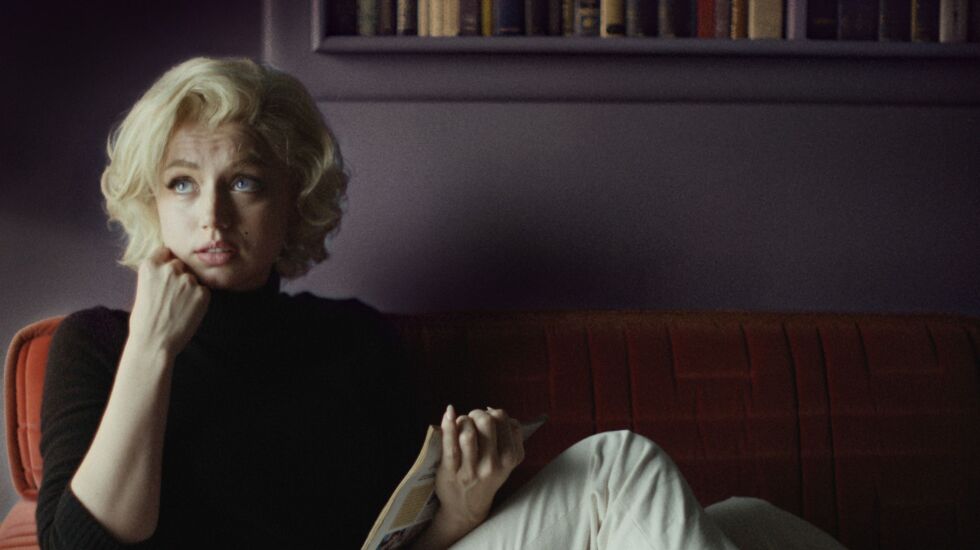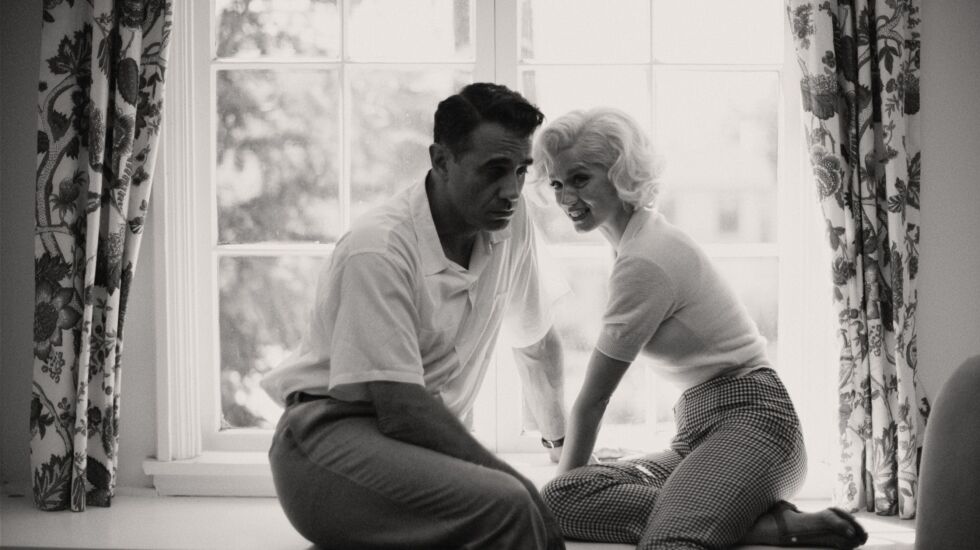
As is the case with Elvis, Hollywood is never going to let Marilyn Monroe rest in iconic peace. Here we are, some 45 years after Presley’s death at the age of 42 and six decades after Monroe’s death in 1962 at the age of 36, and two of the biggest and most anticipated releases of 2022 have been stylized biopics of these respective legends: Baz Luhrmann’s “Elvis,” which is one of the most entertaining movies of the year; and Andrew Dominik’s “Blonde,” which is not.
Not even close.
Clocking in at an excruciating 2 hours and 46 minutes and featuring a nonstop onslaught of attention-getting directorial visual and aural tricks, “Blonde” is a borderline sadistic interpretation of Monroe’s tragic life and times, in which we bear witness to the child known as Norma Jeane and the movie star called Marilyn suffering cruel and abusive and manipulative treatment at the hands of virtually everyone who is close to her. It’s as if she’s starring in a horror movie of her own life.
We know Marilyn had an awful childhood, struggled with mental health issues and alcohol and drug abuse and was mistreated in monstrous ways throughout her career, but in “Blonde,” writer-director Dominik (adapting the novel by Joyce Carol Oates) would have us believe she was happy for maybe six months in her entire life. We’re subjected to one scene after another of Marilyn being publicly and privately abused and humiliated. It’s not so much a biopic as an acidic, exploitative, vulgar nightmare, with Marilyn being exploited once again.
“Blonde” opens with an extended prologue set in the Los Angeles of 1933, as a 7-year-old girl named Norma Jeane Mortensen (Lily Fisher) suffers brutal physical and emotional abuse from her psychotic single mother, Gladys (Julianne Nicholson), who is eventually institutionalized when she completely disconnects from reality. Cut to the early 1950s, when the young starlet Marilyn Monroe, now played by Ana de Armas, is working hard at her craft and hoping to be taken seriously as an actor, even as one studio exec rapes her in his office, and male directors and casting directors chuckle at her attempts to sound well-read and are more concerned with leering at her than appreciating her talents.
There’s no denying the visually arresting look of “Blonde” as director Dominik and cinematographer Chayse Irvin toggle between noirish black-and-white, saturated Technicolor and varying aspect ratios to recreate the look and style of famous Monroe vehicles such as “Gentlemen Prefer Blondes,” “The Seven-Year Itch” and “Some Like It Hot.” But we get only glimpses of Marilyn’s acting and what made her such a star, as the story focuses primarily on her offscreen world — and that’s when the tricks go off the rails, with Dominick indulging in such over-the-top visuals as an orgasm depicted by the waterfall in “Niagara,” a number of in-utero fetus shots that bring up haunting memories of “2001: A Space Odyssey,” and a grotesque scene in which an arrogant, dismissive and cruel President John F. Kennedy (Caspar Phillipson) remains on the phone and forces a highly intoxicated Marilyn to perform fellatio as he verbally abuses her, while he watches the launch of the Friendship 7 rocket on television. (Subtle.)
It’s important to remember “Blonde” is based on Joyce Carol Oates’ highly impressionistic novel, and while it features many of the real-life people and events from Marilyn’s life, much of it is pure fiction, e.g., an interlude in which Marilyn enters into a three-way relationship with the sons of two movie stars: Charles “Cass” Chaplin Jr. (Xavier Samuel) and Edward G. Robinson Jr. (Evan Williams), a couple of handsome playboys who briefly seem to make Marilyn happy. (Though a late reveal tells us one of the men played a stunningly cruel trick on Marilyn that went on for years.)

The film hammers home Marilyn’s issues with the father she never met time and again; she calls her husbands Joe DiMaggio (Bobby Cannavale) and Arthur Miller (Adrien Brody) “daddy,” and is desperately eager to please them. (DiMaggio is depicted as a simpleton who flew into jealous rages and physically beat Marilyn, while Miller is a mostly sympathetic character, though he seems to love the idea of Marilyn more than the real woman and is helpless to cope with her addictions and delusions.)
Ana de Armas has movie-star looks and legitimate acting chops, and with the great assistance of the hair and makeup and costume departments, she bears a startling resemblance to Marilyn Monroe. (At times, de Armas’ Cuban accent does slip through.) It must have been exhausting for de Armas to play this role; when Marilyn is not crying violently, she’s suffering physical and/or verbal abuse, or literally collapsing in a heap from abuse of alcohol and drugs, or suffering a miscarriage, or enduring an abortion that is depicted like something out of a Stephen King adaptation. It’s a memorable performance in a film that wants to dazzle us with its trick bag of visuals but is rotten at its core.







